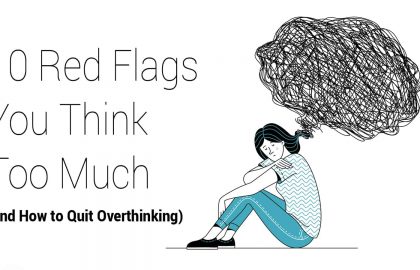Assertiveness is the quality of being self-assured and confident without being aggressive. In the field of psychology and psychotherapy, it is a learnable skill and mode of communication. ~ Wikipedia
Please reread the above definition, but this time try to list as many of the keywords or phrases that you find. Write them down.
Got it? Okay, so here they are:
– ‘Quality’ – in this respect, a personality trait.
– ‘Self-assured and confident’ – understanding your worth and portraying a poised attitude.
– ‘Without being aggressive’ – assertiveness is not aggressiveness – it is relaxed and thoughtful; not forceful or brash.
– ‘A learnable skill’ – Assertiveness is a trait that can be developed.
– ‘Mode of communication’ – Assertiveness is evident through both verbal and non-verbal means of communicating.
Why Being Assertive Is Crucial
Now that we have a contextual understanding of assertiveness, let’s talk about its role in our lives.
We’ll all concede that the world is full of problems. Should you feel the need to convince yourself, flip on the local news and watch for five minutes! It helps to have a disposition of assertiveness when things get hairy.
We all experience good, bad, and neutral relationships. Many have had someone (many times, a trusted someone) betray, harm, or unjustly oppose them.
The relationship dynamic of human beings has been illustrated using a summarized version of ‘The Parable of the Sheep,’ which involves three characters:
– The Wolves: Default mode is aggression and violence; they prey on the sheep. They act without a conscience.
– Sheep: Innocent and loving; yet at times meek and passive. They are targets of the wolves.
– Sheepdogs: Also benevolent and loving, yet have the capacity for swift action. Sheepdogs protect themselves, the sheep, and stand up to the wolves.
What differentiates sheepdogs from wolves is their concern for the welfare and safety of others; acting with a purpose and with intelligence, and having a healthy mindset. Should the need arise, the sheepdog will act swiftly and definitively, though it is neither their default or preferred state of being.
In this story, the sheepdog is an ideal example of assertive behavior.
“That’s great,” you may think, “but how does this apply to me?” Well, although this article focuses on assertiveness and relationships, it is relevant to many areas of your life, including:
– Work: doing what needs to be done.
– Home life: taking care of family, friends, and responsibilities.
– Self-discipline: being persistent and not acting whimsically.
– Goal achievement: having a purpose and a plan for life.
Relationships and Assertiveness
Relationship-wise, assertiveness is acting in a manner appropriate for the person and situation. In relationships, the assertive person:
– is respectful at all times
– communicates directly, honestly and openly
– tactfully says what needs to be said
– humbly explains what they need or want
– acts in an honorable, virtuous manner
As stated, assertiveness is a learned trait.
In the context of relationships, here are eight things assertive people do differently:
1. They know their intention
Before you initiate a discussion or raise an issue, your intention should be well understood. When you engage in a semi-serious talk without having a plan (the requisite knowledge, how to present ideas, etc.), you risk losing the attention of the person on the other end. A lack of intention is a lack of assertiveness.
2. They pick their battles
In any relationship, personal or professional, it is essential to pick your battles. In other words, we must forgo the need to be right (even if we are) unless the matter is of a critical nature. One right way to pick your battles is to keep your eye on the prize; whether it’s a promotion, loving relationship, peace of mind or something else.
3. They use empathy
Empathy is the ability to put yourself in someone else’s shoes. Assertive communication occurs when you treat the other as an equal, not less than or better than yourself. If necessary, to get into this state of mind, try practicing self-compassion (meditation is an excellent way of doing this!)
4. They do not sacrifice their values
When it comes to relationships, do you have a set of values by which you abide? These individual values (or virtues) are compelling because you and only you are responsible for their implementation. Respect, equality, honesty, dignity, and other core values should be adhered to in every interaction – good or bad.
5. They are active listeners
It does no good to communicate with assertiveness only to tune out when someone else has their say. Active listening, whether in a personal or professional setting, demands three things: complete attention to the speaker, not interrupting, and asking questions when something is unclear.
6. They finish unfinished business
Assertive communicators don’t rehash mistakes and errors of the distant past during conversation. If the past repeatedly surfaces mid-convo, it is a definite sign that a resolution to the problem was never attained. Address all unfinished situations; then approach the conversation from a ‘From now on’ mindset.
7. They are committed
While this may seem commonsensical, many people stumble over the commitment aspect of conversations, conflict resolution, and relationships. Without an attitude of commitment, little will change. An assertive mindset requires a steadfast assurance from both parties.
8. They say “Please” and “Thank you.”
Courtesy is a powerful relationship builder. Assertive individuals, while inherently polite and well-mannered, are also smart enough to understand those simple niceties can only benefit them and their relationships. Yes, this includes saying “Thank you” upon the conclusion of a dialogue where things don’t entirely go your way.
Stay assertive!
(C)Power of Positivity, LLC. All rights reserved
Sources:
http://www.aipc.net.au/articles/how-to-communicate-assertively-in-your-relationship/
https://clintonpower.com.au/2011/05/10-steps-for-mastering-assertiveness-in-your-relationships/
https://en.wikipedia.org/wiki/Assertiveness
The post 8 Things Assertive People Do Differently In Their Relationship appeared first on Power of Positivity: Positive Thinking & Attitude.





